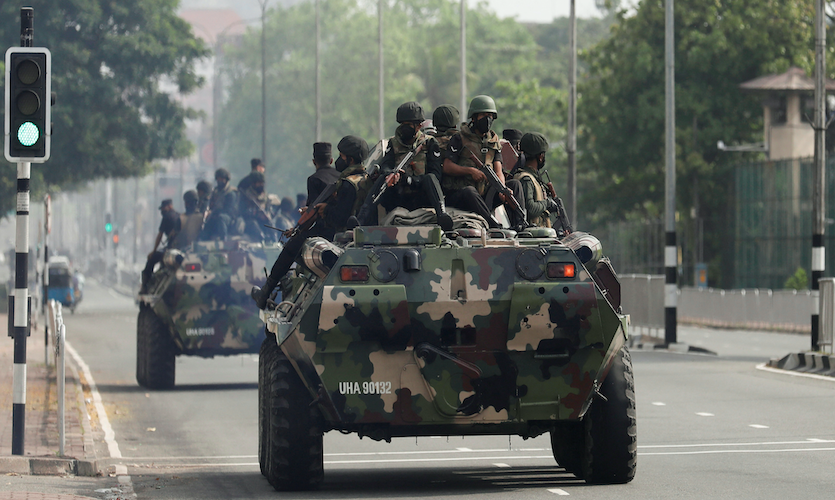Earlier this week, on Tuesday, following the resignation of the former prime minister of Sri Lanka, Mahinda Rajapaksa, violent protests erupted in the country. The clashes were reportedly between two groups, pro and anti-government protesters, and led to several cases of violence, destruction of property, and arson. According to reports, over 200 people were injured and at least eight people were killed in the violence. This prompted the military to conduct an operation to rescue the former PM and his family, as protesters also gathered outside his house.
After their rescue, reports and rumours circulated in the media and on social media, of Sri Lankan politicians and their families fleeing Colombo and seeking refuge in India. On Tuesday, the Indian High Commission denied these claims and released a statement on Twitter saying, “High Commission has recently noticed rumours circulating in sections of media and social media that certain political persons and their families have fled to India. These are fake and blatantly false reports, devoid of any truth or substance. The High Commission strongly denies them.”
India has seemingly distanced itself from any political affiliations amid the recent protests, including the Rajapaksa-led government, to show solidarity and pledge support to the “people of Sri Lanka”. In response to a question about the recent developments in Sri Lanka, the External Affairs Ministry spokesperson, Arindam Bagchi said, “As a close neighbour of Sri Lanka, with historical ties, India is fully supportive of its democracy, stability and economic recovery.” He added, “India will always be guided by the best interests of the people of Sri Lanka expressed through democratic processes.”
“In keeping with our Neighbourhood First policy, India has extended this year alone support worth over US$ 3.5 billion to the people of Sri Lanka for helping them overcome their current difficulties. In addition, the people of India have provided assistance for mitigating the shortages of essential items such as food, medicine etc,” said Bagchi.
On Wednesday, the Indian High Commission took to Twitter again, this time to refute speculative media reports and social media narratives claiming that India is sending troops to Sri Lanka. “The High Commission would like to categorically deny speculative reports in sections of media and social media about #India sending her troops to Sri Lanka. These reports and such views are also not in keeping with the position of the Government of #India,” said the Indian Mission.
On May 10, Sri Lankan authorities issued “shoot on sight” orders for anyone found damaging public property or threatening lives, as informed by the country’s Defence Ministry spokesperson Nalin Herath. This came after anti-government protesters set up a checkpoint on the roads leading to the Bandaranaike International Airport in Colombo to prevent the Rajapaksa family from leaving the country.
Amid the ongoing violence, some anti-government protesters also showed up outside the Trincomalee Naval Base, following media reports of the former PM and his family seeking refugee after their official residence in Colombo was attacked. This is amid a nationwide curfew imposed since Monday, and thousands of troops deployed to maintain law and order.
Sri Lankan President Gotabaya Rajapaksa, for the past three days, has taken to Twitter to appeal for calm and unity among the island nation’s citizens, and condemned the violence. “All efforts will be made to restore political stability through consensus, within constitutional mandate and to resolve economic crisis,” said President Rajapaksa, while reiterating his appeal for the people to stop “violence and acts of revenge against citizens”. Reportedly, the nationwide curfew has been extended to Thursday morning.
Read more: Over 200 People Injured, Eight Killed In Violence After PM Rajapaksa’s Resignation
On the other hand, the International Monetary Fund has indicated that technical level discussions regarding the ongoing economic crisis, between IMF officials and Sri Lankan authorities, are underway. However, they have expressed concerns over the rise of social tensions and unrest. Sri Lanka is in the midst of negotiations with the IMF, seeking their bailout programme, and has also sought India’s help to garner international support for the same. India has also urged the IMF to urgently provide financial assistance to the island nation.
This crisis is partly due to the lack of foreign currency in Sri Lanka, which has almost entirely halted imports for staples such as food and fuel since they are unable to pay for the goods, causing acute shortages and high prices. As indicated by the MEA spokesperson, India has also extended billions of dollars worth of aid and sent consignments of diesel and petrol, as well as food and medicines to Colombo, to mitigate the crisis.










